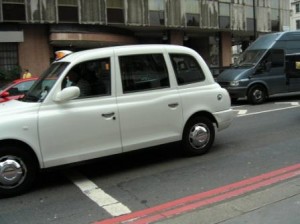 I was in London recently and it is a city where the quality of the taxi drivers is renown – in a very positive way I add! They have to complete something called ‘The Knowledge’ this is learning the whereabouts of a significant number of places, many historic – plus the location of some 25,000 streets in a 6 mile radius of Charring Cross Station, in central London. This is required so they use the best route to take their passengers – called ‘fares’. A test that has been in place since 1865 and is the worlds most demanding course for taxi drivers.
I was in London recently and it is a city where the quality of the taxi drivers is renown – in a very positive way I add! They have to complete something called ‘The Knowledge’ this is learning the whereabouts of a significant number of places, many historic – plus the location of some 25,000 streets in a 6 mile radius of Charring Cross Station, in central London. This is required so they use the best route to take their passengers – called ‘fares’. A test that has been in place since 1865 and is the worlds most demanding course for taxi drivers.
The taxis are known as ‘black cabs’ in much the same way that taxis in New York are yellow. I was waiting at a set of traffic lights ready to cross the road when the taxi cab pictured drew up – I was rather slow in getting my camera out of my briefcase and taking the picture, so by the time I was ready the lights had changed – hence part is missing. It may not be the best picture but it made me think about our use of common terms. London taxis are known as ‘black cabs’ irrespective of colour. And I think this one is as far from black as we can get! The majority are still black but there are other colours too, silver, burgundy, yellow to mention some others..
Now this got me thinking further about terms that are used that probably to a stranger make no sense. A black cab – but it is white!
On my way across London for a friendly meeting I caught the underground train, called ‘the tube’. We were just leaving one of the stations that is above ground, when I overheard a fellow passenger who was visiting from Australia. He was speaking, by mobile phone, to someone they were aranging to meet soon. ‘I am on the train’ he said – it was clear from the following comments that he had caused the other person some anxiety. ‘No I am on the train’ he repeated. Now to a Londoner this means that you are not on the ‘tube’, more likely on a train heading out of London. It was clear they were meeting outside a ‘tube station’ some stops down the line. Fortunately, before the phone signal was lost, he was able to reassure his friend that he was on the right method of transport and not heading off into some other part of Britain, ‘on the train’. Albeit he was rather puzzled as he mentioned to me – ‘He asked if I was on the underground but I could see daylight. He says I am not on a train but it looks like a train from where I come from.’ He had a good point!
So how often do we use a term that to someone, not in ‘the know’, may fail to understand? More crucially though, how often do we use a term that means something different to someone else. At times this may be even worse because they may not seek clarification and we may not realise our message has been misunderstood. I fear I may do it more often than I realise – is there a possibility that you could make the occasional assumption too?
Food for though as I head off for lunch – which some people call dinner – whilst others call dinner, supper!
My best wishes,
Peter